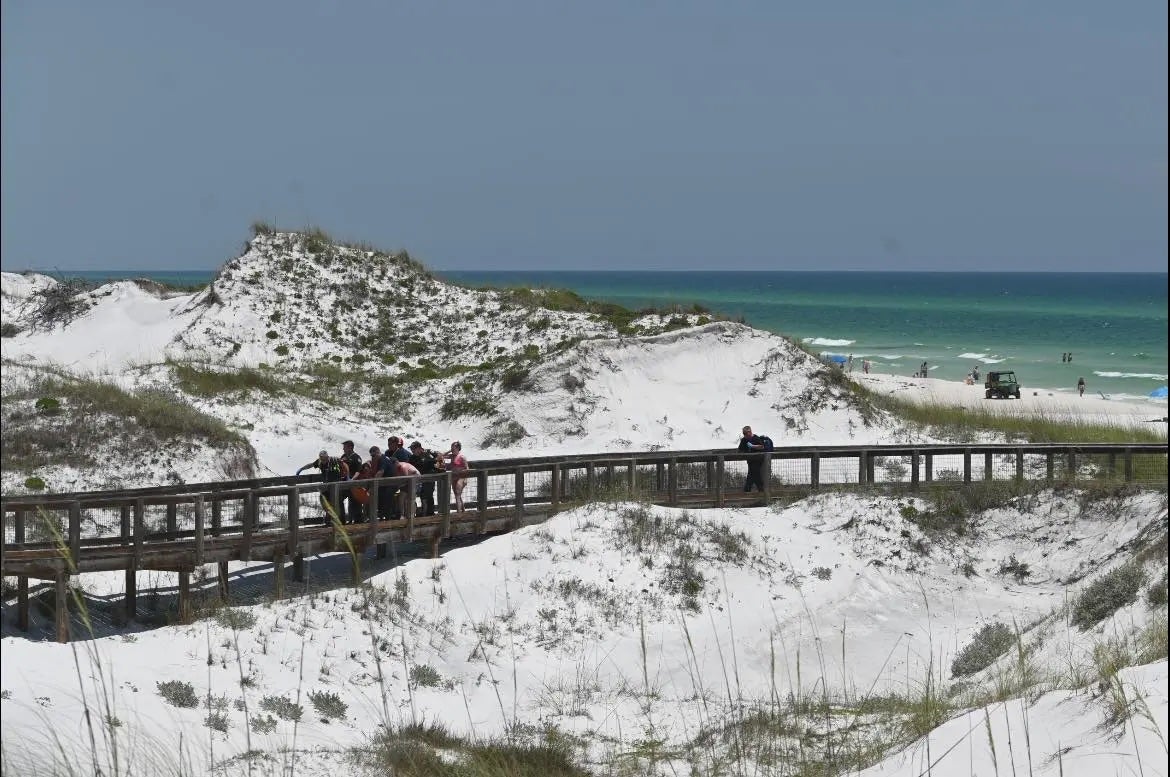
An Alabama teenager who survived a shark attack last year has called for a new alert system to protect others.
Lulu Gribbin, 16, was one of three people attacked by a shark on June 7, 2024, during a series of incidents off the Florida Panhandle. The attack resulted in the loss of her left hand and part of her leg.
On Wednesday, she urged Alabama lawmakers to support a proposed shark attack alert system.
Republican Representative David Faulkner's bill aims to create a system similar to Amber Alerts, notifying the public of unprovoked shark attacks in the area.
“Ninety minutes before me, there was another shark attack a couple miles down the coast,” Gribbin said. Had she known about that attack, she and her friend would not have ventured into the water that day, she said. “This bill will help prevent future attacks and accidents.”
While the proposal would only impact the Alabama coast, Faulkner hopes other states will pursue similar systems or that federal legislation would expand its use.
“There had been a shark attack just down the beach, and yet she had no notice. And I felt like in this day and age, that’s something we shouldn’t let happen,” Faulkner said.

The Alabama House Public Safety and Homeland Security Committee advanced the bill Wednesday. It now moves to the full Alabama House of Representatives.
The bill, which would name the alert system for Gribbin, was changed to issue an alert only when an unprovoked attack occurred off the coast.
An earlier version would have allowed an alert for an “imminent danger” from sharks. There were concerns from beach communities that language was too vague and could lead to an excessive number of alerts, causing panic and potentially hurting the tourism industry.
Gribbin and her friend had been diving for sand dollars before the attack. They were riding the waves back to the beach when her friend screamed, “shark!"
“I saw a big shadow, but we all just started swimming for our lives,” She recalled. She said she tried to remain calm, remembering that sharks were supposed to be attracted to frantic motion. Then the shark attacked her and her friend.
"My hand was bitten first. I remember just lifting it out of the water, and I was stunned because there was no hand there. I couldn’t feel it because of all the shock I was in. Then the shark latched onto my leg," she recalled.
A man she describes as a hero ran to pull her from the water. She blacked out and came to on the shore where a doctor and other medical workers, who were on the beach that day, rushed to save her. “I remember being focused just to keep my eyes open and to breathe, to just be able to make it to the hospital,” she said.

Her lengthy recovery has been documented on social media. As she visited the Alabama Statehouse, people frequently stopped to ask for photographs and to tell her that her story has been an inspiration.
While sharks are commonly found in the waters off Alabama and Florida, shark attacks are rare, according to experts. There were 47 unprovoked bites last year worldwide, according to the University of Florida’s International Shark Attack File.
Alabama Gov. Kay Ivey on Wednesday urged lawmakers to approve the legislation, saying it will be an "added tool" to keep people safe.
“Lulu is truly an inspiration and an awesome example of courage. Let’s be Lulu strong and get this bill to my desk so I can sign it into law," Ivey said in a statement issued by her office.
About $1.8 billion in federal money for Cornell and Northwestern are frozen, the White House says
China issues US travel advisory as Trump ramps up trade war
DOGE ‘auditors’ now being audited by federal Government Accountability Office: report
Nightclub collapse marks Dominican Republic’s worst disaster as death toll hits 184
Trump stokes ‘market manipulation’ accusations with tariffs U-turn: Live updates
China mocks Trump tariffs with AI clip of US sweatshop workers ‘making America great’







